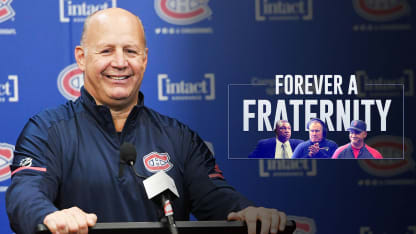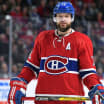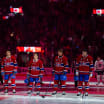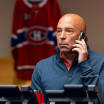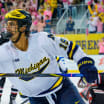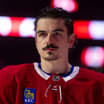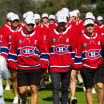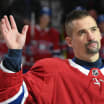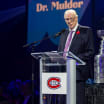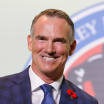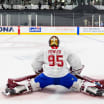By Hugo Fontaine
He may have had four years of experience in the Quebec Major Junior Hockey League - where he won a Memorial Cup - and just over two more seasons behind the bench in the American Hockey League when he took the head coaching job with the Canadiens in 2003, but Claude Julien was still an NHL rookie when he arrived in Montreal. When he returned to town in February 2017, however, it was quite the opposite.
It was really once he took the job with the Boston Bruins - following his January 2006 departure from Montreal and a brief stint with the New Jersey Devils shortly thereafter - that Julien established himself as one of the best coaches in the League. Sure, all the experience he racked up as a bench boss over the years came in handy, but it was also because he was able to benefit from the company and advice of some of the biggest names in coaching.
Being a big sports fan himself, the Orleans, ON native wasn't going to turn down the opportunity to learn from the likes of Bill Belichick, Terry Francona, and Doc Rivers, with whom he would cross paths at various points over his nearly 10 years with the Bruins.
"What I really liked in Boston is that all the coaches supported each other. We know what difficult a profession we're in, whether it's in hockey, football, baseball, or basketball," outlined Julien, whose 419 wins make him the winningest coach in Bruins history to this day. "We all realize that there's a certain amount of pressure that comes with the job. It's important to be able to support each other.
"What's really interesting is that you get to learn a lot about each individual's philosophy on how to build a team and on the way they manage their players, the different demands, and the rules."
Although Julien inherited a Boston team composed of a few stars, the vast majority of his roster was made up of lesser-known - but hard-working - players. It was a squad that, oddly enough, resembled that of the Bruins' neighbours in the suburb of Foxborough - the New England Patriots.
Led by players who were not necessarily picked in the first round of their respective drafts, the Patriots' recipe for success cooked up by Belichick since his hiring in 2000 has proven time and again that it was a model to be replicated around the NFL. Their recent 15th divisional championship in 18 years is just some of the proof located in the pudding.
That may help explain why right from the first time they met, after being introduced by a mutual friend not long after Julien's arrival in Boston, the two clicked instantly. Contrary to his podium persona, Belichick is happy to just hang out and shoot the breeze among buddies.
"I had some good conversations with him about things that have served me well in hockey. Bill is a very different person from what we see when he talks to the media. He's not someone who likes to reveal his secrets," admitted Julien with a laugh, referencing Belichick's propensity for keeping his press conferences rather brief. "In reality, he's a very simple and normal person who loves to chat.
"One thing he would say is you can have really good players with incredible skill, but when the time comes to perform in a big game, they're not necessarily able to produce," he continued. "So as appealing as those players may be, Bill prefers to have guys who are a bit less so, but who will perform."
With more than 30 years of pro football experience to his name, Belichick always enjoyed chatting with - and learning from - his NHL counterpart. And while those conversations may not necessarily have touched on in-game strategy, he certainly still found it refreshing to be able to exchange ideas with a man who understands what it's like to lead a championship program.
"There is always something to learn from other coaches. Sometimes, when it is outside of your familiar framework, you get a completely fresh perspective that, for one reason or another, hasn't come to light," confided Belichick, who owns an NFL-record five Super Bowl rings. "A lot of coaching comes down to teaching and leadership. Claude is outstanding in those areas and there is no question our team benefited from having exposure to him."
The Pats also benefited from Julien's presence on the sidelines for one of their practices at Gillette Stadium, in the days leading up to the 2016 Winter Classic. Belichick had invited Julien to follow him around for the day, allowing him to watch Tom Brady & Co. as they prepared for their playoff run.
"It's completely different than a hockey practice. The team is bigger and they're spread out on the field. The defensive players practice their plays in one spot, the quarterback is at the other end practicing his throws, the kicker is somewhere else," recalled Julien. "The whole team studied their opponents' strategies. I followed Bill everywhere and I found it really interesting. I learned a lot from the visit."
Although Belichick ranks third in all-time NFL wins, even he doesn't have the magic formula all figured out. Which is why, when he invited Julien to the Pats' practice, it was more than a "take your friend to work day." He wanted to hear a fresh perspective from the Jack Adams Award winner and Stanley Cup champ.
"Claude helped bring this city its first Stanley Cup championship in decades, and it was no accident," affirmed Belichick, who will be commencing his quest for a sixth Vince Lombardi trophy in January. "If we could improve or fine-tune anything in our program, whether it is practice, player development, team-building, training methods or any one of several other things, then Claude is definitely a valuable resource.
"Regardless of the sport, coaching is teaching, and practice is the most important part of getting the team ready to play," he added. "Claude's observations about our practice gave me a different and helpful perspective on some of the things we do in practice."
To thank him for the experience, Julien reciprocated the next day by inviting the Pats skipper to an exclusive go-round on the outdoor ice that eventually served as the battle terrain for the Bruins-Canadiens showdown. Given that his last time on skates - in a beer-league game - was well behind him, Belichick savored the one-of-a-kind opportunity, with Julien playing the role of gracious host.
"It was a lot of fun just being out there with him. I felt like a little kid with the pros and I'm sure he was holding his breath the entire time that I wouldn't fall down in front of everyone. He was very gracious and welcoming," remembered Belichick, who took a few tumbles during the skate nonetheless. "I needed plenty of help! I love to skate, but I was rusty after a decade of not skating. I proudly display the skates and gloves he gave me in my office."
It takes about an hour to get from the home of the Patriots to the Bruins' barn, but Julien only had to travel a matter of steps in order to visit his counterpart on the Boston Celtics, Doc Rivers, a fellow tenant at TD Garden. And just like Julien did for the city in 2011, Rivers also ended a long drought in Boston in 2008 when he led his team to their first NBA championship in 22 years.
Several months after the Bruins raised the Stanley Cup, Rivers and his team were navigating an interesting situation, when they were forced to play 66 games in 123 days following the NBA lockout. So when Julien and his team found themselves in similar territory the very next season with a 48-game schedule packed into 99 days, the then-Bruins bench boss went to go pick the brain of his neighbor at the Garden to find out how he managed the challenge.
"We know that a lot of games get condensed into a half-season schedule, and the basketball schedule is pretty similar to hockey's. He once told me, 'Claude, you're going to have to make a choice: either get your team to practice, or let your players rest.' I had to decide if our team would be better off if we practiced or rested. In his opinion, that was going to be my biggest challenge," explained Julien, who led the Bruins to the Cup Final in 2012-13, where they lost to the Chicago Blackhawks in six games. "He went with giving his team more rest and I ended up doing the same."
Now the head coach of the Los Angeles Clippers, Rivers still keeps an eye on Julien's results. Despite the fact they haven't seen each other since he left for California five years ago, Rivers still feels extremely privileged to have gotten to know him during their years in Boston.
"I would always run things by him. He's a great people person, so those skills always translate through sports," said Rivers, who currently sits in seventh place in NBA history with 82 playoff wins. "It was always nice to be able to talk to him and catch up.
"Our relationship is great, but the cross-sport thing is amazing. We coach two completely different games, but at the end of the day, you're still dealing with people," he continued. "When I talk with Claude [Julien], Bill [Belichick], or Terry [Francona], it's all about people skills, more than it is about X's and O's."
Just like Belichick and Rivers, Terry Francona became a legend in the Boston sports world in his own right by leading the Red Sox to two World Series titles, including the club's first since 1918 in 2004. Well-known as one of the most affable, player-friendly managers in the majors, Francona has had to deal with his fair share of strong personalities while managing to extract the best out of his athletes in 17 years on the job.
But like many Montrealers, Julien first heard of Francona when he played for the Expos in the early 1980's. In addition to being able to learn from a man with such a distinguished resume, Julien found it that much more special to be able to meet a player from his favorite childhood team.
"I was a big fan of the Expos when I was younger, and I remember Terry Francona when he played for them. We've met several times. He's a great person and his players love him," Julien attested of Francona, who managed the Red Sox from 2004 to 2011. "We know the baseball schedule is twice as long as ours, the players get to the stadium in the early afternoon and leave late at night. Those are some long days. That's what made it interesting to get different opinions on how to manage different individuals."
The two first made contact in 2007, when Julien congratulated Francona for his second World Series win, and the former Red Sox skipper returned the favor a few years later when he wished Julien luck ahead of Game 7 of the Stanley Cup Final between the Bruins and Canucks.
Francona admits he isn't the biggest hockey fan, but says he was nonetheless appreciative of the exchanges he's had with Julien over the years. After hearing such good things about him, the current Cleveland Indians manager has tucked away some special memories from their encounters.
"Even though the sports are different, when you're talking to other coaches, I feel the same way. Guys who have been doing it for a while and have been successful, it's fun to hear things they say," offered Francona, a two-time AL Manager of the Year.
"Some sports, things don't necessarily carry over, but when you're talking about winning cultures and competing and things like that, those things go into every sport.
"It's not going to add or subtract to your wins and your losses; we all kind of get into tunnel vision during our seasons," he continued. "But it's enjoyable because I'm a sports fan. So when you have the opportunity to meet other people and see them behind the scenes, it makes it more fun to root for them."
Julien was the first to admit that he's become a different coach since his first go-round in the 514. With a Stanley Cup ring, an Olympic gold medal, and a Jack Adams Award to his name, his resume has certainly been beefed up in his time between stints. On top of that, the different encounters he's had with his counterparts in Boston have given him even more tools at his disposal, which have been put to use already in Montreal.
Listening to the soon-to-be 58-year-old, it's clear he's got no plans to stop deepening his connections or growing his knowledge base, in his quest to steer the Canadiens to the promised land.
"Meeting all those people has definitely made me better, both as an individual and as a coach. You always want to improve and learn," concluded Julien. "If a coach says he knows it all, it's time for him to retire."

